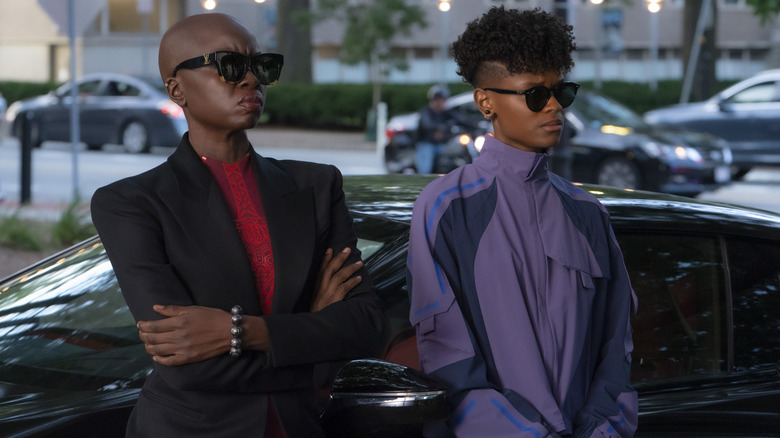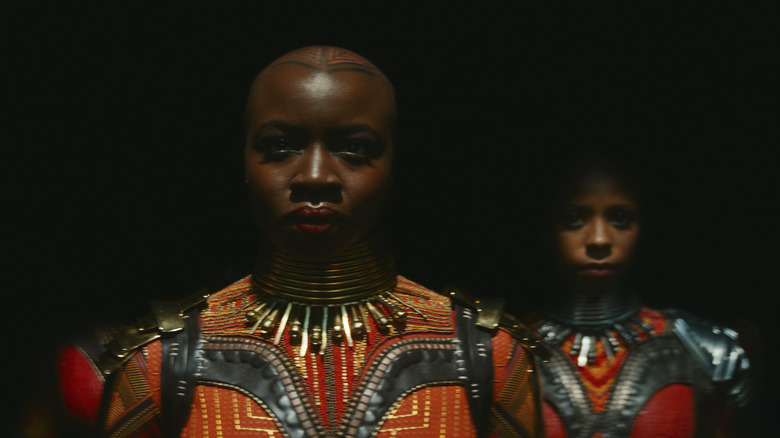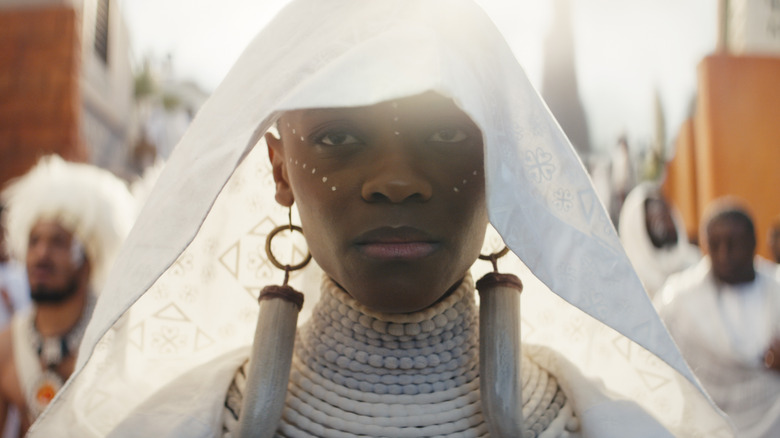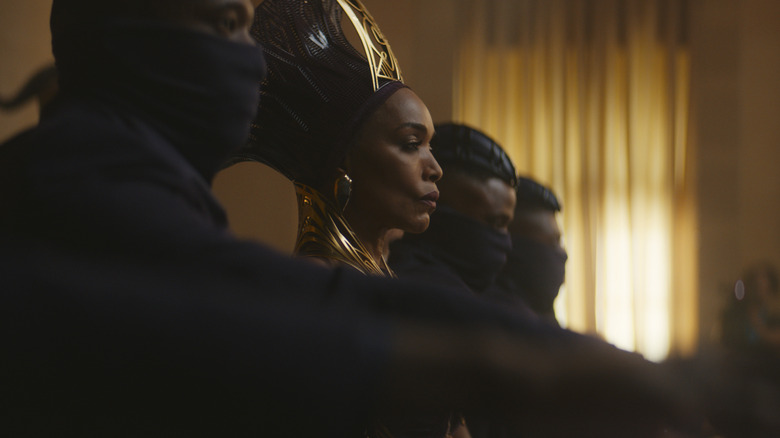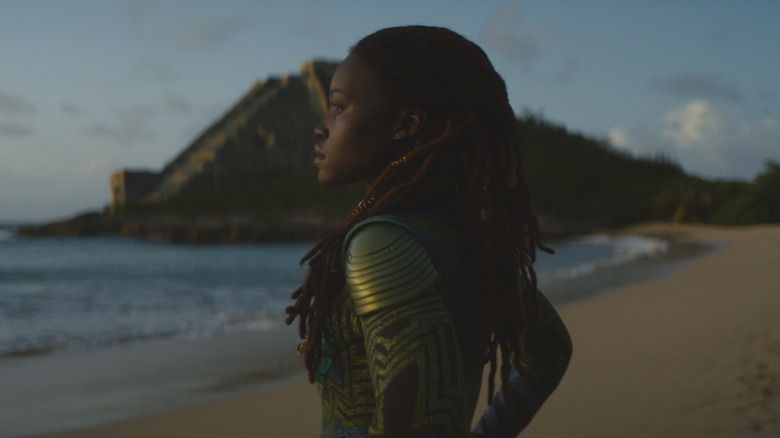Black Panther: Wakanda Forever Is All About The Women Of Wakanda
The untimely passing of Chadwick Boseman shook the world. Losing the beloved actor left us reeling and forced the MCU to reckon with an impossible dilemma: what would become of T'Challa? Could the man behind the Black Panther mantle ever be replaced? The idea of recasting Boseman's character quickly became a controversial topic of discussion, but Ryan Coogler wisely chose to walk a different path. He scrapped his original story and reshaped the sequel to properly grieve both the actor and character while paving the way for others to step forward. The answer was there all along: in T'Challa's absence, it's the women of Wakanda who share the spotlight and lead their nation into its future.
The women of Wakanda have always been bold, brilliant, and undeniably powerful. As T'Challa navigated his earliest days of leadership in 2018's "Black Panther," they assured his success: without their assistance, their counsel, and their unwavering support, Wakanda would have been lost. Yes, T'Challa was the one to sit on the throne, just as he was the one to square off against his various challengers — M'Baku and Killmonger — but protecting Wakanda was no solitary task. In the first film, it's Okoye (Danai Gurira) who constantly comes to his defense on the battlefield, it's Nakia (Lupita Nyong'o) who counsels him towards changing for the better, it's Shuri (Letitia Wright) who creates the very weaponry he wears and wields, and it's Ramonda (Angela Bassett) who reminds him who he truly is.
Wakanda's king was perpetually surrounded, strengthened, and protected by the women in his life — whether that be the wise council of his mother or the spears of the fearsome female warriors, the Dora Milaje. So the idea that Wakanda would be completely lost without him has never felt true.
The women of Wakanda Forever
The rest of this post contains spoilers for "Black Panther: Wakanda Forever."
Together, Wakanda's women are the heart and soul of "Wakanda Forever."
Without its king, the once isolated nation is walking very uncertain ground: no more secrecy and no ancestral protector to scare the world away. Without those vibranium claws on the loose, the world assumes them to be vulnerable — but we know better. When Queen Ramonda stares down the world's representatives, the punchline feels obvious. "We know what you whisper," she assures the global leaders. "They have lost their protector. Now is our time to strike." But that first blow is a failure. When a Wakandan outreach center is attacked, the Dora Milaje emerge from the darkness to defend their people.
The women of Wakanda continue to assume this role throughout the film, the protectors of their nation, and it's not an easy path. But that is so often the plight of Black women — to shoulder the world's troubles, carry the systemic burden, and still persevere. The weight of grief takes its toll on all the women in this film: Ramonda, Shuri, Okoye, and Nakia are each mourning T'Challa and struggling to understand their path forward. But they also have a nation to protect and that dedication never wavers.
Shuri takes center stage
Above all else, "Wakanda Forever" is Shuri's movie, thrusting her into the spotlight not just as the new Black Panther but as a new leader for Wakanda. None of that comes easily to her. Shuri suffers a crisis of faith after her brother's passing. All that she once believed in — the spiritual and the scientific — has become unrecognizably complex. How could the ancestors let this happen? How could she? Once aware of her brother's illness, she made every effort to recreate the heart-shaped herb, but no amount of scientific prowess came to his rescue. A year later, she has abandoned that pursuit and thrown herself into work, refusing to properly mourn T'Challa lest she gives into a desire to "burn the world."
Shuri is no more perfect a leader than her brother before her; letting rage and vengeance consume her before sense tales over. Ironically, this is when Shuri finally accepts tradition, recommitting herself to synthesizing the heart-shaped herb and embracing the Black Panther mantle. For her, it's a way to see her mother again (a pursuit that doesn't work out), but it's also a way to seek some retribution for that loss. Ignoring counsel from M'Baku ad Nakia, she gathers her forces to attack Namor.
Shuri is the crux of a movie that lives and dies on its emotional resonance. Her journey is messy, complicated, and so imperfect. And "Wakanda Forever" gives her grace for those mistakes — the same space afforded to the messy Marvel heroes that have come before her. And in the end, it's another woman that pulls her back from the edge, with the same words that once woke T'Challa: "Show them who you are."
Wakanda's unshakeable Queen
While Shuri is front and center, she is not the only one processing. When we first met the poised Queen of Wakanda, Ramonda was mourning her husband and celebrating her son's ascent to the throne. This time she mourns her son and does her best to mother her daughter — all while protecting her now-exposed nation from the prying eyes of the world.
As with the other women of Wakanda, the sequel allows us to see the full scope of Ramonda — complexities, faults, and all. When her daughter is put in the line of danger, Ramonda reaches a breaking point and directs the brunt of her anger at Okoye. "Have I not given everything?" she questions, a rare crack in her composure of regal poise.
Dismissing the dedicated warrior from her position is rash, as her counsel points out, but it doesn't stop Ramonda from acting. And despite Namor's warnings that a single Wakandan in the ocean will start a war, she still makes every effort to rescue her daughter. A queen she may be, but Ramonda is also a mother. Though she dies midway through the film, she lives on through her daughter. She saves Wakanda from beyond the grave, her memory forcing Shuri to abandon her vengeance.
Sisterhood above all
Though Okoye is dismissed as general of the Dora Milaje, she never stops fighting for her country. That's no surprise, of course — Okoye is as dedicated as they come. But have you taken a moment to grasp the sheer insanity of all that she's been through? She led the Dora through Killmonger's incursion, turned against the false king (and her own husband), helped to fend off Thanos' army, watched her king turn to dust, defended Wakanda through the Blip years, and eventually, lost her king again. And in the midst of all that, Wakanda has become exposed to the outside world for the very first time. Who could blame her if she took that dismissal as an excuse for a vacation?
But even outside of the Dora Milaje, protecting her people is Okoye's duty, one she is willing to die for. Hell, she even throws her traditional sentiments out the window and dons the very cool supersuit that she was vehemently opposed to. Whatever it takes to protect Wakanda.
Similarly, Nakia has kept her distance from Wakanda for the sake of her son, but at one mention of Shuri's name, jumps to her defense. Like the nation's secret weapon, she leaves retirement to infiltrate Talokan and rescues the Princess all on her own. And when the time comes for the two superpowered nations to square off, it takes all of them coming together for Wakanda to triumph.
The greatest success of "Wakanda Forever" is spotlighting each of these women as they are — warriors, leaders, mothers, sisters, and very fallible human beings. They are the people left to defend T'Challa's legacy, and the ones tasked with leading Wakanda into its future. In Shuri, Wakanda has its ancestral protector — special herb, vibranium claws, and all. But the strength of Wakanda has always been bigger than just the Black Panther.
